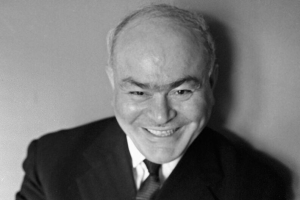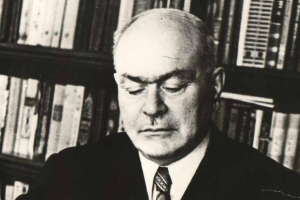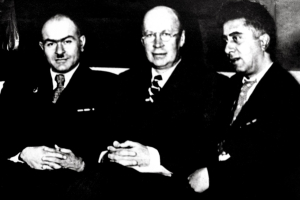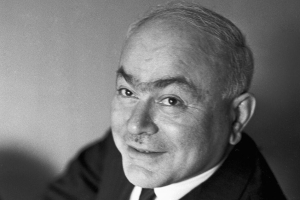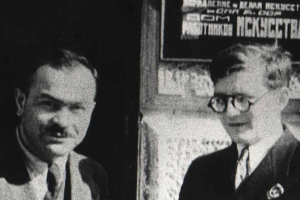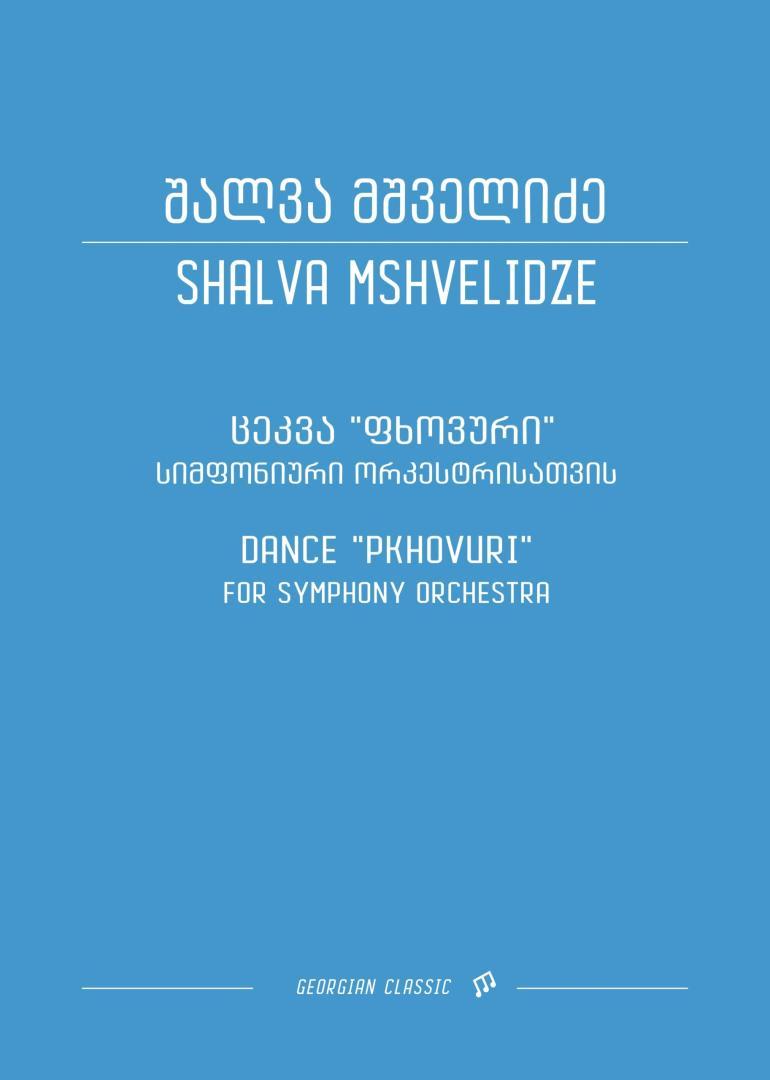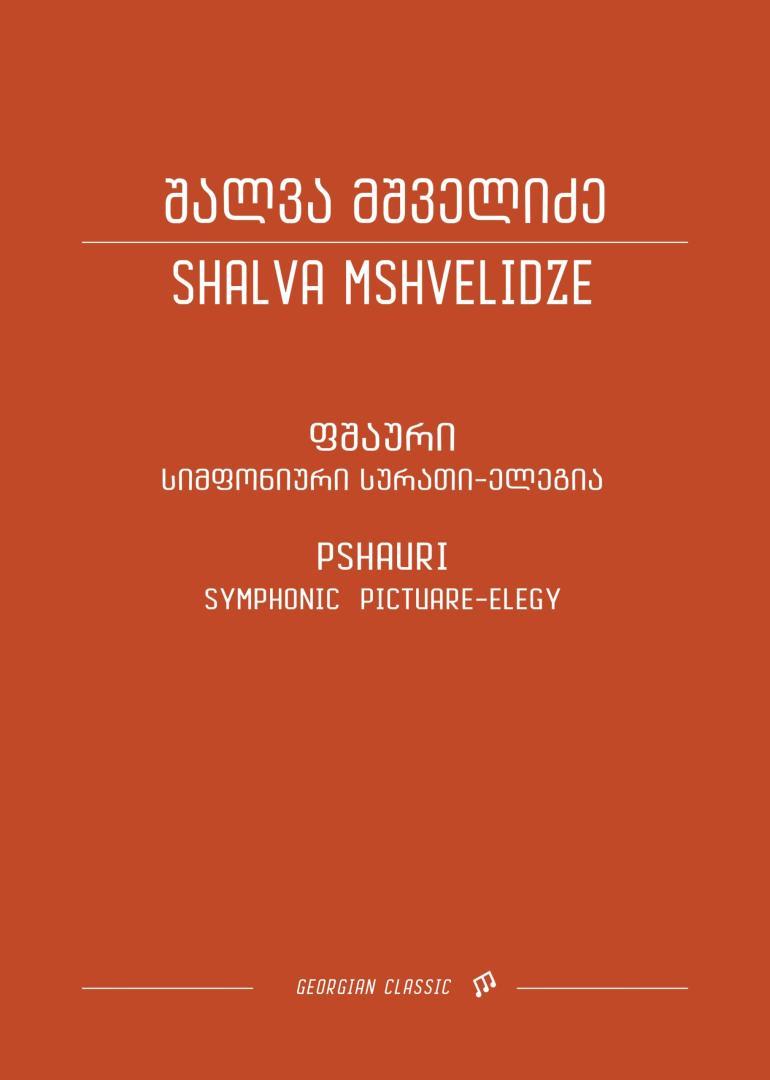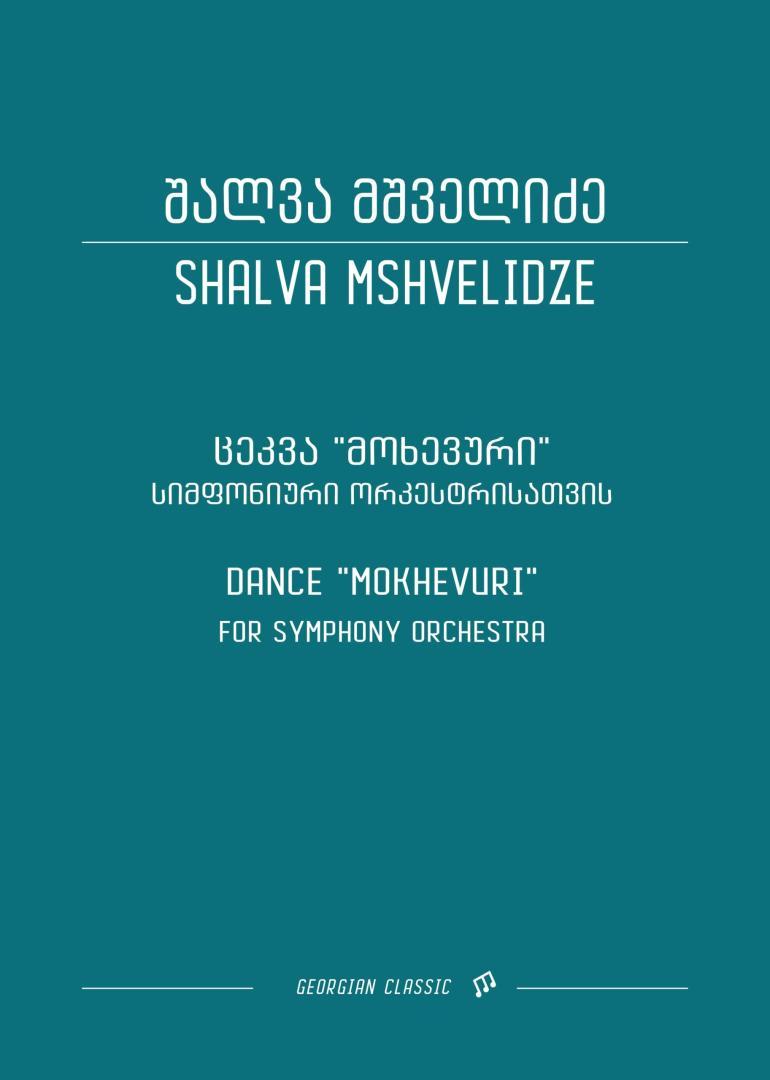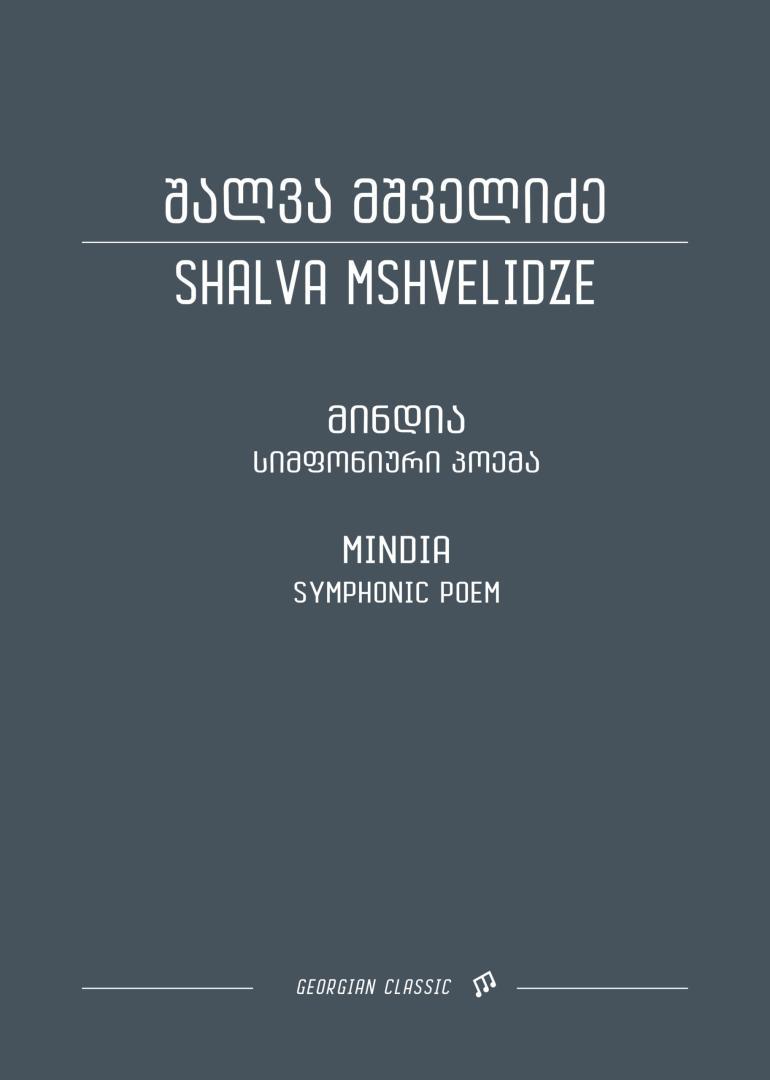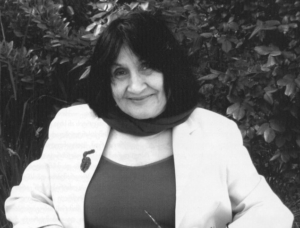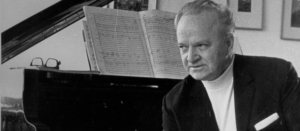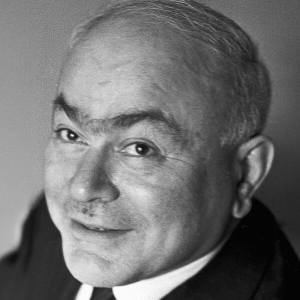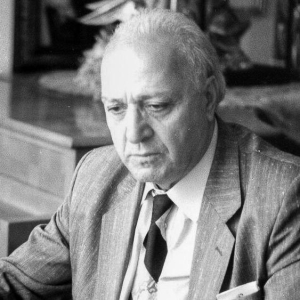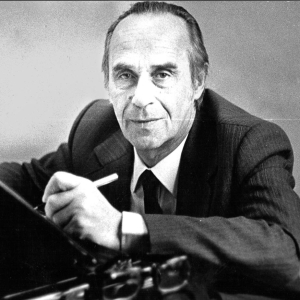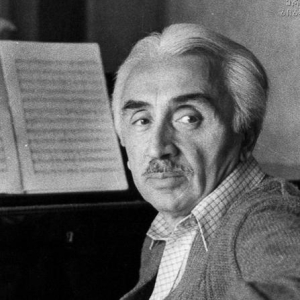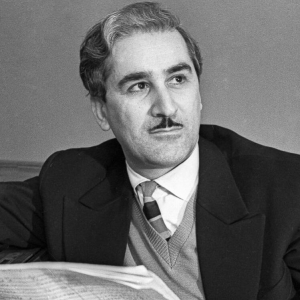Shalva
Mshvelidze
Shalva Mshvelidze
(1904 – 1984)
Georgian composer, People’s Artist of the Georgian SSR (1942), Stalin Prize laureate (1947) and Knight of the Order of Lenin.
Shalva Mshvelidze was the first to introduce the Pshav–Khevsur musical dialect into Georgian professional music;
Shalva Mshvelidze laid the foundation for the epic symphony genre in Georgian symphonic music. It is the great merit of Shalva Mshvelidze that he was the first to express the epic of Vazha–Pshavela in Georgian symphonic music with its greatness, to show its charm.
He is the author of fundamental researches: “Musicology”, “Orchestral Theory”;
Date of birth – May 15, 1904
Place of birth – Tbilisi, Georgia
Date of death – March 5, 1984
Place of death – Tbilisi, Georgia
He is buried in Didube Pantheon of Writers and Public Figures – Tbilisi
BIOGRAPHICAL DATA
1930 – Graduated from the Tbilisi State Conservatory named after Vano Sarajishvili, majoring in composition (class of M. Bagranovski and S. Barkhudariani);
1928 – 1930 – During the years of being a student at the conservatory, he started collecting samples of folk music on the instructions of Dimitri Arakishvili. He visited Svaneti, Tush–Pshav–Khevsureti, Kizik, Kakheti, Kartli, Meskhet–Javakheti, Guria, Adjara;
1933 – Post–graduate student of St. Petersburg N. Rimsky–Korsakov Conservatory. Under the leadership of Shcherbachov;
1921 – 1927 – Head of various choral ensembles;
1921 – 1927 – in Tbilisi public education labor schools;
Since 1929 – Assistant teacher at the Tbilisi State Conservatory named after Vano Sarajishvili, then teacher, docent;
Since 1942 – Professor of Vano Sarajishvili Tbilisi State Conservatory;
1930 – 1940 – held various administrative positions in the Tbilisi State Conservatory named after Vano Sarajishvili – head of the composition department, dean of the theoretical–compositional faculty…
1947 – 1950 – Director and artistic director of the Georgian State Song and Dance Ensemble;
1950 – 1952 – Director of the Tbilisi Opera and Ballet Theater named after Zakaria Paliashvili;
AWARDS AND RECOGNITION
1932 – Union of Composers of the Soviet Union, member
1948 –1979 – Member of the Board of the Union of Composers of the Soviet Union
1941 – 1945 – Union of Composers of Georgia, Chairman (1941–1951)
1941 – Honored Worker of Georgian Art
1941 – USSR State Prize
1942 – Stalin Prize
1947 – USSR State Prize
1947 – laureate of Zakaria Paliashvili prize
1958 – People’s Artist of Georgia
1958 – Honored Art Worker of the Abkhaz SSR
1971 – Award named after Zakaria Paliashvili
1973 – Jawaharlal Nehru Award (India)
Order of Lenin
Shalva Mshvelidze
(1904 – 1984)
SELECTED WORKS
MUSIC FOR THE THEATER
1945 – “The Story Of Tariel” – Opera in 4 Acts – (libretto – A. Faghava)
1960 – “The Grandmaster’s Right Hand” – Opera in 4 Acts – (libretto – N. Dzidzishvili)
1968 – “Soldier’s Widow” – Opera in 3 Acts – (libretto – O. Chelidze)
1960 – “Aluda Ketelauri” – Opera in 3 Acts – (libretto – Sh. Mshvelidze)
ORCHESTRAL MUSIC
1943 – Symphony N 1
1944 – Symphony N 2
1952 – Symphony N 3 “Samgori”
1968 – Symphony N 4
1975 – Symphony N 5
1943 – Symphony N 6 “Chatilloni”
1933 – “Pshauri” – Symphonic Picture-Elegy
1933 – “Azar” – Symphonic Picture-Ode
1933 – “Khorumi” – Symphonic Picture
1949 – “Dawn” – Symphonic Picture
1940 – “Zviadauri” – Symphonic Poem
1950 – “Mindia” – Symphonic Poem
1962 – “Tiger And Servant” – Symphonic Poem
1973 – “Poem About Georgia” – Symphonic Poem
1954 – “Symphonic Dances”
1955 – “Indian Suite” – for Symphonic Orchestra
1956 – “Polyphonic Suite” – Symphonic Cycle
1955 – “Indian Suite” – for Symphonic Orchestra
1958 – “Burmese Pictures” – for Symphonic Orchestra
1955 – “Celebratory Overture” – for Symphonic Orchestra
1979 – Concerto for Piano and Orchestra
VOCAL-INSTRUMENTAL MUSIC
1963 – “Caucasion” – Oratorio – for Soloists, Mixed Choir and Symphony Orchestra – (text – G. Abashidze, G. Leonidze, I. Grishashvili)
1963 – “Eternal story” – Oratorio – for Mixed Choir and Symphony Orchestra – (text – V. Mayakovsky, A. Bezimensky, A. Surkov, R. Rozhdestvensky, B. Beketov, M. Lisyansky, M. Nagnibeda)
1934 – “Pshauri” – Choral Poem
AUTHOR OF MANY CHORAL WORKS AND SONGS
FILM AND THEATER MUSIC
MUSIC FOR THE THEATER – THE AUTHOR OF MORE THAN 40 PLAYS. BETWEEN THEM:
“Guria Ninoshvili”, “Aprakune Chimchimeli”, “Broken Bridge”, “Yesterday’s”, “Natsarkekia”
SCIENTIFIC PUBLICATIONS
“Instrumentation Science. Theoretical Foundations of The Modern Orchestra
Shalva Mshvelidze
(1904 – 1984)
Shalva Mshvelidze is a well-known Georgian musician. He gave Georgian professional music such a nuance that his individual composition was named “Mshvelidze’s Musical Language.” Strong national roots feed Mshvelidze’s work. Dmitry Shostakovich once pointed out – “When I hear Shalva Mshvelidze’s works, will make mountains dance! Shalva Mshvelidze mastered a wide variety of Georgian folk music and transformed it into classical music. He also contemplated the work of world composers, which is remarkable. The main idea was the introduction of intonation, which was based on Mount Pshavi’s folklore in eastern Georgia.
This is a peculiar intonation of an archaic Pshavri one-voice song with a fierce, mysterious tonality, which the composer termed “Pshauri Kilo.” Later, this kilo-melody became the basis of Mshvelidze’s compositional handwriting, and first was noticed in the choral work “Pshauri” (1934), and afterward in the symphonic transfer of the same name. The symphonic miniatures “Pshauri” (1933) and “Azar” (1933) were among the composer’s first works to fascinate the public’s attention. These works became the starting point for Mshvelidze’s work at the same time. In the symphonic work “Zviadauri,” “The mountain energy” – which the composer referred to as a symphonic poem, the synthesis of archaic and classical vocabulary took on a new level. The work’s idea is based on Vazha-poem Pshavela’s “Guest-Host,” the importance of which is a conflict with the mountain’s old customs. As a result of these works th e composer has a new perspective of the symphonic poem genre in terms of form and structure. In terms of genre, this is creation a heroic-epic canvas, that is accompanied by a philosophical-psychological interpretation. In Georgian professional music, “Zviadauri” became leading work, which brought Georgian symphonic music to popularity.
The orchestral epic miniature, which developed into first Symphony “Azar” (1943), was delivered as a trigger for the Second Symphony (1944). The composer’s intonation language was expanded in this work, and it’s artistic value was defined by its explanation and approval of the symphony principle. The 2nd Symphony is also noteworthy as the first coral genre, in Georgian professional music. This symphony formed the epic-genre symphonism as a style of music. “Samgori,” the third symphony, is one of the heroic-epic symphonies. The 4th Symphony (1968)
was the most popular of the composer’s six symphonies, and it was recognised as a stage forward in terms of structural formation, giving the impression of kilo-harmonic passage, smoothness of timber sounding! The symphonic poem Mindia is written, according to Vazha Pshavela’s poem in (1950). In this piece, Mshvelidze’s way of thinking and other elements of musical speech were revealed. The work focused on kilo-harmony, counterpoint variability, improvisational synthesis of improvisation and symphonism.
Four operas have been written by Shalva Mshvelidze. “The Story of Tariel,” his first opera, is based on the poem “Vepkhistkaosni” by the great Georgian poet, Shota Rustaveli. The composer was directed by the literary source to combine folk elements from various parts of Georgia. The opera-oratorio “Story of Tariel” was first performed in 1946 at the Tbilisi State Opera and Ballet Theater. In 1961 at the Tbilisi Opera and Ballet Theater was performed Shalva Mshvelidze’s opera “Didostatis marjvena” , which was based on the novel of the same title by Georgian writer Konstantine Gamsakhurdia. The composer’s wish to express himself artistically driven him to write a folk musical drama. This time, the author drew attention to the opera’s theme of mountain people, their inner strength and power. According to musicology, the connection with Mussorgsy’s style is demonstated. Above mentioned Mshvelidze’s playwrights are based on the Georgian choir epic and Georgian classical opera. Mshvelidze’s vocal works are noteworthy. Wth works like as “Women of Tushi,” “Orovela,” “Shirak Oil,” and “Gakha Tsiklauri” he introduced himself to the public. “Women of Tusheti,” “Orovela,” “Shirak Oil,” and “Gakha Tsiklauri” were works for Soprano-High pitched and Pianoforte. The repertoire of Georgian singers’ are represented by “Women of Tusheti” and “Orovela”. “Orovela” is the most difficult to perform. Choral work is an important aspect in composer’s career. The style of music of these works were shaped by the Soviet era. These works are represented as Melancholic, mass, marching songs. Their value is expressed in the original synthesis of national folklore, with interesting polyphonic findings. “Khorumi” for symphony orchestra (1933, the first Georgian orchestral work based on national folk dance), symphonic image “Sunrise” (1947), oratorio “Caucasus” (1949), Indian Suite “(1955),” Polyphonic Suite “(1956), the symphonic poem” Servant and Tiger “(1962), romances, and so on, according to musicologist, researcher of composers’ works, Anton
Tsulukidze – Mshvelidze has left a legacy of innovative national culture which is still regarded as to be explored.
Musicologist
Tamar Tsulukidze
English Language Translator
Tamar Kharadze



